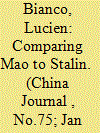|
|
|
Sort Order |
|
|
|
Items / Page
|
|
|
|
|
|
|
| Srl | Item |
| 1 |
ID:
145245


|
|
|
|
|
| Summary/Abstract |
China’s leaders often claim that the rising tide of mass protests in recent years is primarily driven by popular anger over the widening gap between rich and poor. However, in a series of national surveys that I helped direct, it becomes clear the average Chinese citizen is less angry about current income gaps than citizens in many other societies. There also is no clear increase in such anger over time (despite a sustained rise in income inequality). The primary drivers of popular anger lie elsewhere—primarily in power inequalities, manifested in abuses of power, official corruption, bureaucrats who fail to protect the public from harm, mistreatment by those in authority, and inability to obtain redress when mistreated. China’s leaders have done an impressive job in recent years of addressing poverty and material inequality, thus keeping the distributive injustice social volcano dormant. However, they have so far been unwilling or unable to make fundamental reforms to address procedural injustices. Unless they can provide Chinese citizens with more effective protections from the arbitrariness and abuses of entrenched power, a shared sense of injustice will persist, and this active volcano will continue to smolder, with the potential to erupt and threaten Party rule.
|
|
|
|
|
|
|
|
|
|
|
|
|
|
|
|
| 2 |
ID:
145246


|
|
|
|
|
| Summary/Abstract |
With the world’s largest population and fourth largest territory, China’s size renders it difficult to govern. The degree to which the Communist Party has for years prioritized the task of “maintaining stability” (weiwen) is a key testimony to the potential fragility of the regime. A principal question that logically follows is: what keeps the regime from falling apart? This article surveys a range of instruments that the central government has deployed both historically and today in efforts to govern China’s centrifugal localities. Seven dimensions of control—ideological-normative, institutional, resource-allocative, personnel management, administrative monitoring, powers over key local sectors, and military force—are examined to assess the center’s adaptive capacity in local governance.
|
|
|
|
|
|
|
|
|
|
|
|
|
|
|
|
| 3 |
ID:
145248


|
|
|
|
|
| Summary/Abstract |
The Greek historian Plutarch famously compared over 40 illustrious Greek and Roman men. This article merely compares two tyrants—Stalin and Mao. Whereas Alexander and Caesar, or Demosthenes and Cicero, lived centuries apart, Stalin and Mao were contemporaries. Rather than recalling their uneasy relationship, this study evaluates and compares three aspects of their performance and misdeeds. As Stalin and Mao were responsible for the deaths of more of their own people than the average tyrant, the study first compares their cruelty and argues that Mao was much less cruel and, second, much less efficient and prone to pursue mutually contradictory aims. Third, he proved more faithful to revolutionary ideals. Two periods during their rule, the Great Terror (1937–38) and the Cultural Revolution, are recalled in order to illustrate the points under discussion.
|
|
|
|
|
|
|
|
|
|
|
|
|
|
|
|
| 4 |
ID:
145247


|
|
|
|
|
| Summary/Abstract |
Since the mid-2000s, China has experienced a wave of large environmental protests against major economic development projects. Based on both interviews and documentary sources, this article examines four prominent cases and identifies four innovations in China’s popular politics: broadened protest constituencies, mobilization for public goods, a proactive strategy to prevent government projects, and a mutual reinforcement of street mobilization and policy advocacy. These new traits of popular resistance have also begun to appear outside of the environmental arena. The way was paved for these innovations by transformations in the public sphere, a relative decrease in the risk of protest participation, and development of the environmental NGO sector. Although the new repertoire of contention appears in only some of China’s abundant protests, it is becoming more widespread and in some cases influences government policy. Recent environmental protests may well stand at the forefront of broader changes in the landscape of Chinese sociopolitical activism and contentious politics.
|
|
|
|
|
|
|
|
|
|
|
|
|
|
|
|
| 5 |
ID:
145249


|
|
|
|
|
| Summary/Abstract |
Accounts of the tumultuous initial phase of the Cultural Revolution portray party-state cadres primarily as targets of a popular insurgency. Cadres in Party and government organs in fact were themselves in widespread rebellion against their superiors after October 1966, and rebel cadres were a major force in the national wave of power seizures that destroyed the civilian state in early 1967. The rebellion was a form of bureaucratic politics in a setting characterized by rapidly shifting signals and high uncertainty, in which the rebels’ motives were generated after the onset of the Cultural Revolution. Cadres played a central role in the destruction of the political institutions to which their vested interests were inextricably linked.
|
|
|
|
|
|
|
|
|
|
|
|
|
|
|
|
|
|
|
|
|